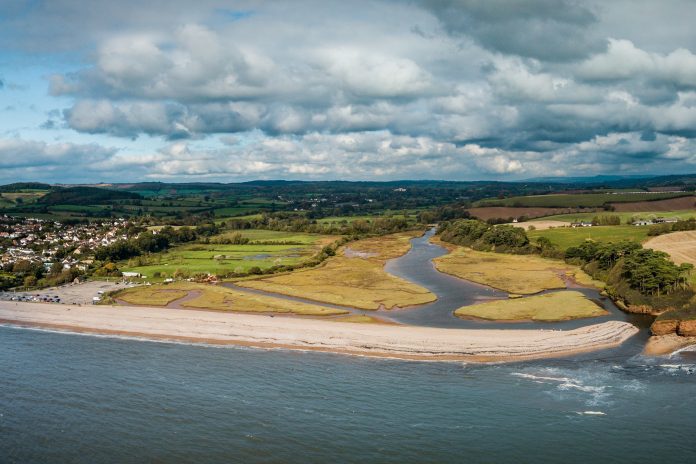East Devon District Council has approved a pioneering project to help a river valley on England’s Jurassic Coast adapt to climate change and create an internationally important wildlife reserve.
The EU-funded Lower Otter Restoration Project (LORP) will reconnect the River Otter to its historic floodplain and return the lower Otter Valley to a more natural condition; creating more than 50ha of intertidal mudflats, saltmarsh and other valuable estuarine habitats.
LORP is a partnership between the Environment Agency, local landowner Clinton Devon Estates, and the East Devon Pebblebed Heaths Conservation Trust that currently manages the estuary. It also has the support of Natural England, RSPB and Devon Wildlife Trust.
The success of the £15 million project rested on it being given the thumbs up by East Devon District Council. Planning approval means work on the project can start this spring (2021) and be completed by early 2023.
The Lower Otter Restoration Project is mainly funded by the European Interreg programme through an initiative called Promoting Adaptation to Changing Coasts (PACCo). It is partnered with a similar project in the Saâne Valley in Normandy, France. Both are pilot projects that aim to demonstrate an important principle – that early adaptation to climate change brings greater benefits than a delayed response or inaction. If successful, the adaptation model for these two projects will be rolled out to other locations in the UK and France.
The Lower Otter estuary lies within the Jurassic Coast, a World Heritage Site and is a Site of Special Scientific Interest (SSSI). Planning approval marks the culmination of seven years of public consultation, careful planning and detailed discussions between a wide range of stakeholders.
The River Otter is already known as one of the first locations in England to successfully reintroduce the beaver.
Although much loved, the Lower Otter Valley has been heavily modified by human hand in the last 200 years with the construction of an embankment, a road, a rubbish tip, an aqueduct and an old railway line. These structures are difficult and expensive to maintain and restrict natural processes including the movement of water. This reduces habitat quality and diversity. Since the creation of an embankment in the early 19th Century, the River Otter has been disconnected from much of its natural flood plain.
The creation of new habitats and restoration of the site will be achieved by breaching the embankment.This will allow a much greater extent of the original floodplain to flood at high tide and drain at low tide producing important intertidal habitat, mudflats and saltmarsh for wading birds. There will also be areas of reedbed and grazing marsh.
Once established, the new site will become a wildlife reserve of international importance within five years, fulfilling the aspirations of all partners involved.
Mark Rice, Environment Manager for the Environment Agency, said:
Climate change is affecting the way we manage our coasts and estuaries and we must adapt to that change.
The Lower Otter Restoration Project is an example of how we can do that.
We aim to deliver long term benefits for people and wildlife by working in partnership and through more sustainable management of the Otter Estuary.
Dr Sam Bridgewater, Head of Wildlife and Conservation at Clinton Devon Estates, said:
The Estate is proud to be associated with this project. Coastal communities must adapt as sea levels rise and storm events become more frequent.
It is our belief the Lower Otter Restoration Project will provide a more sustainable and certain future for the threatened Otter valley. It will also deliver very significant benefits to people and wildlife.
The granting of planning approval is a major step forward in helping us deliver this vision.
We have worked very closely with a wide range of stakeholders who have helped us reach this milestone and we are grateful for their input over the years.
The project website can be found at www.lowerotterrestorationproject.co.uk







